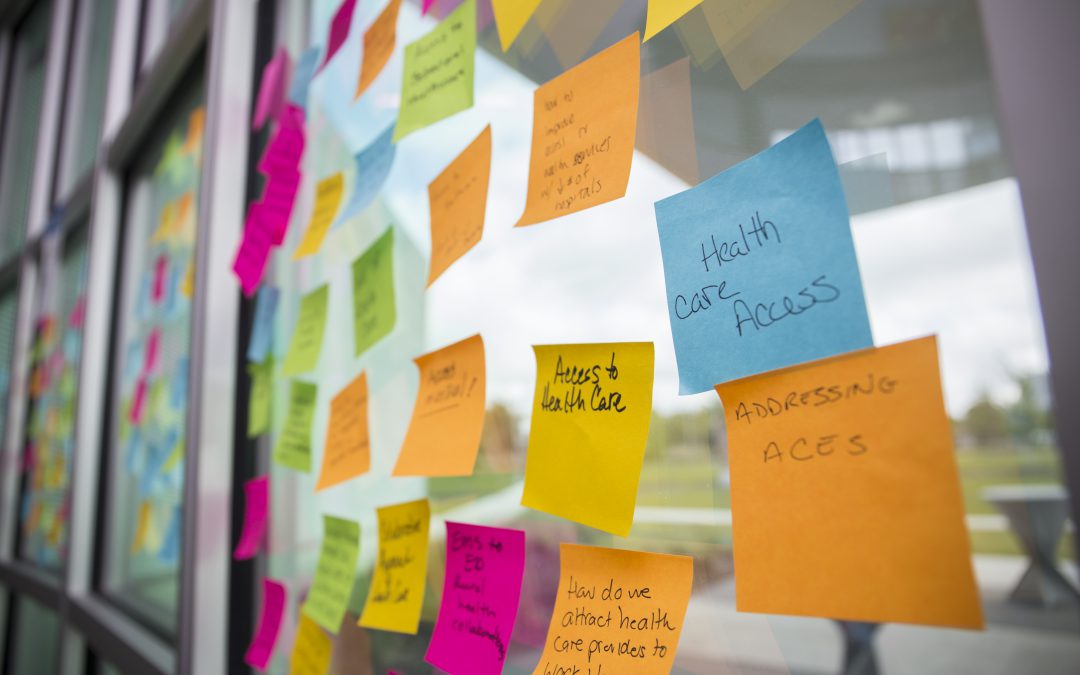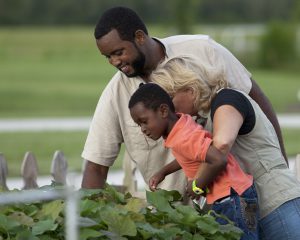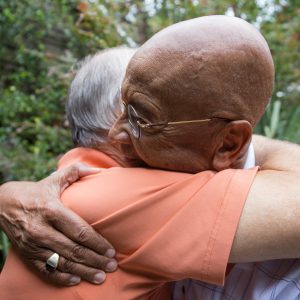
by Julie McMillian | Apr 1, 2021
Have you thought about your mental and emotional health lately? If you haven’t, it’s a great time to take some time to invest in you. Emotional wellness is the ability to handle and overcome challenges and obstacles that we often must deal with in everyday life. It doesn’t mean you will always be happy, but you are aware of and in control of your thoughts, behaviors, and actions when you have negative feelings or setbacks. Research shows that emotional health is a skill. There are many ways to improve and maintain your emotional health so you can adapt to changes as they happen.
Tips for Emotional Wellness:

Spend time with loved ones to strengthen your relationship.
Photo credit: UF/IFAS
- Stay positive. Purposely develop a positive mindset and hold on to the positive emotions and appreciate the good times as long as you can. Focus on your outlook. Ask yourself: What gives me inner peace? What gives me purpose? Remember to forgive yourself and others for making mistakes.
- Reduce stress. Stress can push you to your limits. It can also motivate you with a rush of energy when needed. It is important to eliminate long-term stress, if possible, and strive for balance. Learn what relaxation techniques work best for you. Deep breathing, meditation, and exercise are healthy ways that could provide release. Set priorities and don’t be afraid to ask for help when needed.
- Take care of your physical health. Plan to eat healthy meals, get enough rest, and exercise. Your physical health directly relates to your mental health. There are so many things we want to fit into a day but there’s not always enough time. Establish set times to help keep you on track. Avoid too much caffeine, alcohol, and stimulants, especially late in day when it could affect your nighttime routine.
- Strengthen your relationships. Build strong connections with your partner, family, friends, neighbors, and co-workers. These social relationships help us to find purpose and meaning. Join a group focused on a favorite activity or hobby. Take a class and learn something new. Volunteer in your community and share positive habits with others. Others can have powerful effects on our health and link us to opportunity.
- Think before you act. Be aware of your emotions and reactions so you can harness them when you are triggered, or something is bothering you. Notice what makes you happy, sad, or mad, and take a few minutes to think before you address or try to change a situation. It’s okay to express your feelings to others and not keep everything within. We must be mindful of how it comes across or affects the other person. Take a walk or some deep breaths and allow yourself to process during a difficult time.
How you feel can affect your daily activities and relationships. People who have good mental health can still have mental illness, so remember to consult your doctor for ongoing concerns. There could be chemical imbalances that need the right kind of treatment. There are also counseling and support groups that can help when you need extra support. It’s up to you to start making healthy choices and taking control of your overall wellness. I hope you feel encouraged and take steps to develop resilience in the face of adversity. For more information on healthy living or other Extension-related topics, you can contact your Family and Consumer Sciences Extension Agent at your local UF/IFAS Extension Office.
Sources:
https://www.nih.gov/health-information/emotional-wellness-toolkit
https://edis.ifas.ufl.edu/topic_mental_health

by Heidi Copeland | Oct 16, 2020
Fall is in the air! In addition to the crisp, cool weather comes the season of two of the top consumer spending events: Halloween and the winter holidays.

Receipts add up quickly
Photo Source: Heidi Copeland
In 2019, according to the National Retail Federation’s annual survey, U.S. consumers spent $2.6 billion on Halloween candy alone, about $25 per person. This does not even take into consideration all the other bits and pieces that can go into more elaborate Halloween celebrations: decorations, entertainment and activities, costumes (for kids, adults, and animals), cosmetics, food and drink, and even stationery such as cards and party invitations. Overall, Halloween retail spending was estimated at $8.8 billion in 2019.
Next in line are the winter holidays. These include Thanksgiving, Black Friday, Small Business Saturday, Cyber Monday, Super Saturday, and Christmas. Even with the Covid-19 quarantine, consumers are on track to start the 2020 seasonal spending spike. For many, Covid-19 has provided a state of anxiety, isolation and uncertainty. The upcoming seasonal events can be a big boost in providing a bit of nostalgia, normalcy and fun.
It is important, however, to heed the words of The Cat in the Hat: It’s fun to have fun, but you have to know how!
The truth is the US economy thrives on consumer spending! But, be honest, does derailing your budget for stuff you might have to pay for later really make you feel better? Seasonal spending is the type of spending that can lead families into the New Year with stress and anxiety. Be aware of spending temptations and triggers.
Wikipedia defines temptation as a desire to engage in short-term urges for enjoyment. Anything that promises pleasure can be tempting. Triggers are a stimulus that alerts your brain and body to an old, known experience, which makes it more likely that we will engage and buy something.
For example, a trigger could be a smell. You might think, “I smell cinnamon. Cinnamon reminds me of fall at grandma’s. Her house always smelled like cinnamon.” The temptation would then be: “Cinnamon brooms are at the check-out cashier. I think I will buy one.”
Recognize what sets you up – smells, prices, product placement, etc. There is a method behind the madness of marketing, all of which is geared to attract a consumer to make a purchase. This year especially, anything that offers nostalgia, normalcy, or fun will be a hot commodity.
Knowing your values and goals, and creating a plan for spending (budget), will help you organize your spending. Know, too, it is reasonable to spend money on fun stuff this season of spending. But also remember: happiness is a sense of well-being, joy, or contentment. It is very hard to buy that!

by Heidi Copeland | Apr 22, 2020
 Families across the country are adapting to the challenges in daily life caused by the COVID-19 pandemic. Families with children face even more challenges. The task of keeping children occupied, and attempting to keep up with schoolwork, monitoring “screen time,” feeding, etc. is NOT easy!
Families across the country are adapting to the challenges in daily life caused by the COVID-19 pandemic. Families with children face even more challenges. The task of keeping children occupied, and attempting to keep up with schoolwork, monitoring “screen time,” feeding, etc. is NOT easy!
Nonetheless, it is very important to remember that children look to adults for guidance. We can help make lemonade out of lemons, even in the face of a pandemic by focusing on the positive. Adults can model a whole host of problem-solving skills for children of all ages. We can also show children how to be flexible, how to make do and improvise, and how to be compassionate.
As we all work though adjusting to a new normal, know that WFSU public television has expanded their educational services by providing emergency at-home learning content to assist families, students, and teachers throughout their viewing region during the coronavirus outbreak.
The Public Broadcasting Act of 1967 requires Public Media (WFSU) to serve everybody, everywhere, every day for free. WFSU Public Media is doing just that.
WFSU Public Media is working hard pursuing their education mission, clearing their normal daytime schedules, broadcasting grade-appropriate instructional programming, as well as creating and curating educational games and other online content. WFSU educational television programs are geared to helping children succeed in school and in life (https://wfsu.org/education/).
The new daytime WFSU At-Home Learning block of programs begin at 6 a.m., focusing on preschool to 3rd grade learners. You will find “Wild Kratts,” “Daniel Tiger,” “Curious George” and other classic PBS KIDS programs.
At 11 a.m. programming shifts to target middle and high school students. Programs like “Nova” focus on science, “The Great American Read” on English Language Arts, “Masterpiece” on British literature and “American Experience” on U.S. history, just to name some of the PBS programs featured.
Plus, WFSU is working with local school districts to ensure that they can link students to these resources and utilize PBS Learning Media, an online repository of content that is aligned to Florida curriculum standards.
Additionally, WFSU, knowing that their youngest viewers and their families count on the entertaining and educational programs normally shown on the HD channel in the daytime, moved the PBS Kids 24/7 channel, to one of their digital services available free over-the-air and also to Comcast channel 203. It is also live streamed on the WFSU website: https://wfsu.org/education/watch-live-wfsu-pbs-kids-360/.
WFSU Public Media is also providing critical assistance through public safety communications and local programming that gives our communities trustworthy information about every aspect of the health emergency.
Thank you, David Mullins, general manager of WFSU Public Media, including the Florida Channel, and Kim Kelling, director of content and community partnerships at WFSU Public Media. Your timely assistance to every person in your viewing area is much appreciated.
WFSU – TV, Channel 11: Bay, Calhoun, Franklin, Gadsden, Gulf, Jackson, Jefferson, Hamilton, Lafayette, Leon, Liberty, Madison, Taylor, Suwannee, Wakulla counties and Georgia counties Decatur, Grady, Thomas and Seminole.
WFSG – TV, Channel 56: Holmes, Washington and Walton counties

by Laurie Osgood | Mar 3, 2020
Friendships are an important part of life, and friendships can have a tremendous impact on our personal well-being and overall mental and physical health. Social isolation can lead to depression and loneliness. The relationships that we build with our family and friends can affect the quality of the friendships that we develop over our lifetimes. Some people thrive socially and develop deep, meaningful connections with others, while others only maintain distant friendships. However, it is important for us to help our children learn to develop these important social skills. Researchers have long documented links between the quality of relationships between family members and their relationships with their peers. Participation in team sports can have lasting benefits, including responsible social behaviors, good sportsmanship, strong leadership skills, academic success, and self-confidence.

Parents can form lasting friendships while supporting their kids in youth sports. (Photo source: Laurie Osgood, UF/IFAS Extension)
When It Comes to Youth Sports, Parents Don’t Always Behave Themselves.
As team sports become more competitive, there is increased attention placed on the negative aspects of team sports, mainly parental expectations and behavior. Having spent a large part of my life sitting in the stands watching my children play team sports, I have developed deep, long-lasting friendships with the parents of my children’s friends. These friendships are often maintained between parents long after our children put away their soccer cleats. Of course, overbearing parents can take the fun out of sports for our children. Many children drop out of team sports because they are no longer having fun and participation becomes too stressful.
What Can Parents Do to Help Their Kids Develop Positive, Warm Friendships?
- Continue to nurture and support the friendships that you have established throughout your lifetime.
- Be a good sports parent by showing support to your child.
- Model good friendship skills. This will help youth understand social competence.
- Be happy and have fun at your child’s competitions.
- Minimize pressure & don’t coach your child from the sidelines.
- Nurture the youth’s ambitions, but don’t let them get too wrapped up in the competitiveness.
- Be respectful of your child’s teammates, coach, opponents, and the game’s rules and traditions.
It is our job as parents to teach our children social skills to help them grow as individuals, not just athletes. As parents it is our job to nurture their emotional and physical development. Even as adults we must continue to stay connected with our friends and families. As we grow older, good friendships can prevent loneliness, improve our health, boost our well-being, and even add years to our lives.

by Stephanie Herzog | Nov 27, 2019
The holidays are upon us! The holidays are a beloved time of year for many, but they are also a source of stress. Stress is defined by an individual’s values, beliefs, and perceptions, so it may look different to everyone. Whether you’re preparing for parties or family to come visit, dreading interacting with a certain family member, planning your holiday budget, or struggling with remembering a lost loved one, stress affects many people this time of year. Here are three tips for managing your stress this season.

Loving and caring relationships go a long way to relieve stress. (Photo Source: UF/IFAS)
1. Be Meta
Metacognition is thinking about your own thought processes. If you feel your stress winding up, stop and analyze your thought processes and the environment around you.
Ask yourself a question such as:
“Why I am feeling this way?” or “Why did I have this connecting thought and/or emotional reaction because of this specific event?”
Consciously recognize your signs of stress and do something about it:
“I’m feeling stressed because my muscles are tight and I’m irritable, so what is a healthy coping mechanism I like to use, and when can I take a break to go cope?”
Being more aware of your thoughts, feelings, and environment helps keep you in tune with managing your stress in a healthier way.
2. Take A Moment
Remember that to successfully help others, you first need to take care of yourself. The holidays make that even easier to forget, it seems. Too much psychological stress can lead to physical illness, which takes an even bigger toll on your overall well-being. So take a moment to yourself to refresh or recharge, whether it’s five minutes alone meditating or practicing mindfulness/awareness, going for a short walk, or taking an amazing 20-minute power nap. Reach out to friends and family to help you cover your responsibilities (such as caring for children), if needed, while you take a moment. Right now, I’d like you to take a moment and make a list of 3-5 simple things you can do to help yourself de-stress as the holidays approach, so you are armed with coping power when the stress arrives.
3. Don’t Deny
Denial is a poor stress management too; it’s a defense mechanism, not a healthy coping skill. It can be beneficial in the short-term, depending on the situation, but is largely harmful if used long-term. The refusal to believe there’s a problem only brings more stress. Not only does denial hurt you, but it hurts the people around you as well. Remember to trust those you love if they express concern about you or feel as though you’re denying something that’s negatively affecting you. Try not to defend yourself or attack them. First, take a step back, breathe in, and examine any validity to their claim with a good dose of humility. Chances are, they mean well and want to help, so it’s worth a self-examination. The ultimate goal is for you and your loved ones to be healthy and happy, and coping with stress positively is one great avenue to achieving that goal!
Enjoy yourself this time of year as you serve and spend time with others, but remember also to take care of yourself!
Source:
Boss, P. (2002). Family stress management: A contextual approach (2nd ed.). Thousand Oaks, California: Sage Publications.

by Stephanie Herzog | Oct 11, 2019
Have you ever been bullied or know someone who has been bullied? I know I have. October is National Bullying Prevention Month. Each October since 2006, there has been a national effort to raise awareness about bullying and provide education and resources to try to prevent it. According to data from 2017, about 20% of youth ages 12-18 experienced bullying at school and nearly 30% reported cyberbullying during their lifetime. That is a lot of our country’s youth!
What Exactly is Bullying?
Bullying is unwanted aggressive behavior. Bullying must have a real or perceived power imbalance between the bully and the victim, where the bully uses their power to control or hurt their victim. The bullying behavior needs to be repeated over time, or at least have the potential to repeat over time.
There are three categories of bullying:
- Verbal bullying includes teasing, taunting, threats, or name-calling
- Social or relational bullying includes ignoring someone on purpose, ostracizing, spreading rumors, or embarrassing someone
- Physical bullying includes damaging belongings or harming another’s body such as spitting, hitting, pushing, rude gestures, or tripping

The constant and easy access of cell phones, social media, and the internet has increased the real dangers of cyberbullying. (Photo source: UF/IFAS)
Cyberbullying
Technology has changed the ways of bullying. Bullying is no longer only ‘picking on’ someone, making fun of them, calling them names, or ignoring them at school. The constant and easy access of cell phones, social media, and the internet has truly expanded bullying to an unthinkable, unending scale. There are many ways to bully someone online, including:
- Verbal attacks, mean messages, or rumors on social media accounts, online games such as Fortnite, or through email or text
- Releasing embarrassing or inappropriate pictures, GIFs, or videos online or through text (e.g. sexting)
- Creating fake profiles or hacking into someone’s account online in order to hurt that person
Perhaps one of the most dangerous things about cyberbullying is once something is posted online and is circulated, it’s very hard to permanently remove. This oftentimes makes escape from the bullying unusually difficult or even seemingly impossible. It’s so important to keep up with ways technology is advancing in order to protect ourselves from things like cyberbullying.
Effects of Bullying
The negative psychological effects of bullying are very real – for the bully, the victim, and those who may witness it.
For the bully, they have a greater risk of using substances, engaging in risky or violent behavior, being abusive in future relationships, committing crimes, and developing other external behavior problems.
Effects of bullying include low self-esteem, fear, loneliness, heartache, and potential physical illness. These effects put a widespread toll on the mental, physical, and social health of the victims and also those who witness bullying. The increased risk of using addictive and illegal substances, anxiety, depression, eating disorders or even becoming suicidal are to be taken seriously and should be treated appropriately. Seek out mental health professionals or physicians and consult with them on the best combination of treatment. These effects can last days, months, years, or even lifetimes depending on the person and the circumstance.
The Story of Amanda Todd
The story of Amanda Todd is an unfortunate real example of cyberbullying and how unforgiving and never-ending it can be. Amanda ultimately committed suicide to get away from it; she was only 15 years old. Her YouTube video, published in 2012 a month before she committed suicide, has 13.5 million views to date. To better understand the reality of bullying, please consider watching it or sharing it. However, viewer discretion is advised.
Bullying, harassment, discrimination, or any other type of negative, cruel, or harmful behavior is never okay or acceptable in any way. If you have been a witness of bullying or a bully, stand up to stop it! If you have been bullied or know someone who has, please seek help from caring professionals, family, or friends. Go-to resources are found below.
Additional Resources
Stop Bullying Now Hotline: 1-800-273-8255
- Available 24/7, managed by the U.S. Department of Health and Human Services
National Suicide Prevention Lifeline: 1-800-273-8255
- Available 24/7, there is an online chat option available here
The Trevor Project: 1-866-488-7386
- Available 24/7, suicide prevention help specifically for the LGBTQ+ community
- Texting and chat options are available here
National Eating Disorders Association: 1-800-931-2237
- Mon-Thu 9am-9pm, Fri 9am-5pm
The Cybersmile Foundation
STOMP Out Bullying
Stopbullying.gov
Sources
National Center for Educational Statistics, Indicators of School Crime and Safety Indicator 10: Bullying at School and Electronic Bullying, April 2019.
Cyberbullying Research Center
The Amanda Todd Legacy












